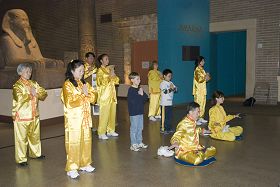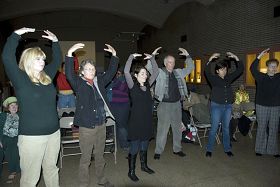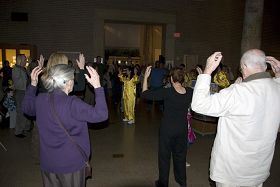Celebrating the Chinese New Year at the University of Pennsylvania, Practitioners Promote Falun Dafa (Photos)
(Clearwisdom.net) From 11:00 a.m. to 4:00 p.m. on January 24, 2009, the University of Pennsylvania Museum of Archeology and Anthropology held a "World Culture Family Day" to celebrate the Chinese New Year. The activity attracted many who were interested in Chinese culture and art. For the 11th time, the museum invited Falun Gong practitioners in the greater Philadelphia area to participate.
Many came to the Falun Dafa booth for information. Several tourists started doing the exercises following the demonstration played in a video. Practitioners demonstrated the exercises at noon in the Lower Egyptian Gallery, and many were drawn to participate. Many people learned the exercises. Afterward, a lady said, "It's so comfortable. I want to do more."
Eleven years ago, practitioners first introduced Falun Dafa for the activity held by the museum. Many people have learned the practice since then. One of them was Terry. She had Lyme disease at the time, and her every bone and muscle hurt. Half of her body was numb. She learned about Falun Gong and read the book Zhuan Falun when she attended the activity eleven years ago. Since then, she has been given a second life: her disease has disappeared and she feels she knows the meaning of life.
A lady who just came to visit from China said, "Look how great Falun Gong is. So many people want to learn it. If the Chinese Communist regime stopped the persecution now, there will be tens of thousands of people wanting to learn the practice. Who doesn't want to have a healthy body?"
The University of Pennsylvania Museum of Archeology and Anthropology was built in 1887 and is devoted to the research and the understanding of human history and its versatility.


